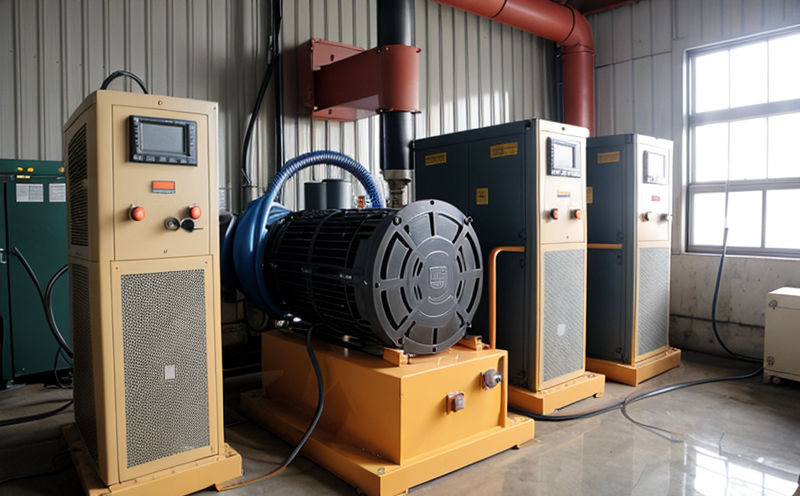ASME Section IX Weld Procedure Qualification Testing in Power Plants
In the power and utilities sector, ensuring the integrity of welded components is paramount. The ASME (American Society of Mechanical Engineers) Rules for Nuclear Reactors and Pressure Vessels, specifically Part II, Division 1, Subsection UU, known as ASME Section IX, provides stringent guidelines to ensure the quality and reliability of welding procedures used in pressure vessels and piping. This section mandates the qualification of weld procedures through the production of qualified joints that meet specified criteria.
At Eurolab, we specialize in conducting ASME Section IX Weld Procedure Qualification (WPQ) testing for power generation equipment. Our services are tailored to meet the stringent requirements outlined by this standard and are designed to ensure compliance with international regulations and industry best practices. This service is particularly critical for components used in nuclear reactors, fossil fuel plants, and other high-stress environments where even minor flaws can lead to catastrophic failures.
The testing process involves several stages:
- Selection of appropriate materials and welding processes
- Development of a weld procedure specification (WPS)
- Performance of test welds according to the WPS
- Inspection and evaluation of the test welds to determine compliance with the required standards
The qualified joints produced through this process are then used as reference points for future welding operations. This ensures that all subsequent welds meet the same level of quality, reliability, and safety.
Our laboratory facilities are equipped with state-of-the-art equipment to perform these tests in accordance with ASME Section IX standards. Our team of experienced engineers and technicians is trained to handle complex tasks such as:
- Material analysis
- Welding process evaluation
- In-process inspection using advanced technologies like ultrasonic testing, radiographic examination, and visual inspection
The results of the WPQ tests are meticulously documented and reported in compliance with ASME Section IX requirements. These reports serve as critical documentation for regulatory bodies, ensuring that all equipment is manufactured to the highest standards.
| Test Parameters | Description |
|---|---|
| Material Type | The specific type of metal used in the welded joint, such as carbon steel, stainless steel, or nickel-based alloys. |
| Welding Process | The method and equipment used for welding, including consumable electrodes, filler metals, and non-consumable electrodes. |
| In-Process Inspections | Techniques such as ultrasonic testing and radiographic examination to ensure the integrity of the weld during production. |
The ASME Section IX WPQ process is a cornerstone of quality assurance in the power generation industry. By adhering strictly to these standards, we help our clients meet regulatory requirements while ensuring the safety and reliability of their equipment.
Industry Applications
The ASME Section IX WPQ testing service is essential for a variety of industries where high-pressure systems are in use. These include power generation plants, petrochemical facilities, chemical processing plants, and oil refineries.
- Nuclear Reactors: Ensures the integrity of critical components like pressure vessels and piping used in nuclear reactors.
- Fossil Fuel Plants: Validates the quality of welded components in boilers and turbines.
- Petrochemical Facilities: Guarantees the safety of storage tanks, heat exchangers, and other process equipment.
- Chemical Processing Plants: Ensures compliance with standards for reactors, distillation columns, and other processing units.
The primary goal is to prevent failures that could lead to accidents or downtime. By adhering to the strict requirements of ASME Section IX, we help ensure that these critical components are manufactured to the highest standards.
| Industries | Critical Components |
|---|---|
| Nuclear Reactors | Pressure vessels and piping |
| Fossil Fuel Plants | Boilers, turbines |
| Petrochemical Facilities | Storage tanks, heat exchangers |
| Chemical Processing Plants | Reactors, distillation columns |
Eurolab Advantages
At Eurolab, we pride ourselves on providing comprehensive and reliable ASME Section IX WPQ testing services. Our key advantages include:
- Experienced Staff: Our team comprises highly skilled engineers and technicians with extensive experience in the power generation sector.
- State-of-the-Art Facilities: We are equipped with advanced equipment to perform high-precision testing according to ASME Section IX standards.
- Regulatory Compliance: All our services are aligned with international regulations and industry best practices, ensuring that your components meet the highest safety and quality standards.
- Comprehensive Reporting: Our reports provide detailed documentation of the testing process and results, facilitating compliance with regulatory requirements.
We offer a full range of services to support your ASME Section IX WPQ needs, from initial consultation to final reporting. Our commitment to excellence ensures that you can trust us to deliver high-quality results every time.
International Acceptance and Recognition
The ASME Section IX standards are widely recognized across the globe for their stringent requirements in ensuring welding quality. Many countries have adopted these guidelines as part of their national regulations, making compliance with these standards a necessity for international trade.
- Australia: The Australian Standard AS 2983:2016 aligns closely with ASME Section IX, ensuring mutual recognition between the two standards.
- New Zealand: Kiwibuild regulations also reference ASME Section IX for critical components in power generation equipment.
- United Kingdom: The UK's Health and Safety Executive (HSE) recognizes ASME Section IX as part of its regulatory framework.
The broad acceptance of these standards ensures that the results from our WPQ testing are recognized worldwide, facilitating international trade and collaboration in the power generation sector. Our services are designed to meet these global standards, ensuring that your equipment is not only safe but also compliant with international regulations.





